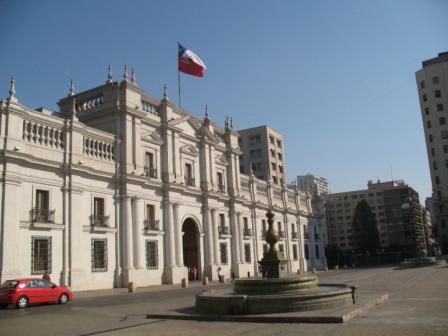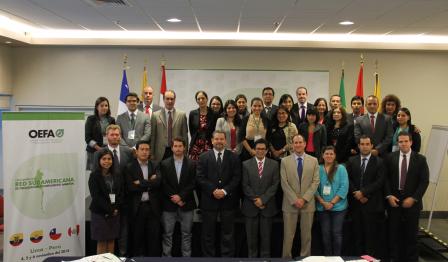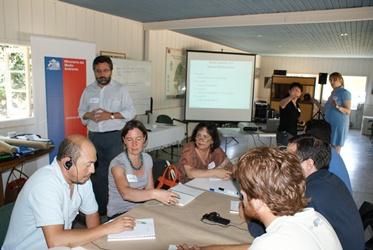EPA Collaboration with Chile
 La Moneda, the Chilean Presidential Palace.The U.S.-Chile Free Trade Agreement entered into force in January 2004. Recognizing the importance of protecting the environment while promoting sustainable development, the governments negotiated an associated Environmental Cooperation Agreement, which is the basis for our environmental cooperation. As a global partner in trade and the environment, Chile is a priority country for U.S. environmental cooperation.
La Moneda, the Chilean Presidential Palace.The U.S.-Chile Free Trade Agreement entered into force in January 2004. Recognizing the importance of protecting the environment while promoting sustainable development, the governments negotiated an associated Environmental Cooperation Agreement, which is the basis for our environmental cooperation. As a global partner in trade and the environment, Chile is a priority country for U.S. environmental cooperation.Explore our work with Chile:
Highlights
Workshop on Emergency Management and Response
March 2019: EPA, in collaboration with our partner Battelle Memorial Institute, delivered a workshop on environmental emergency response to an audience of Chilean government representatives in response to an air quality emergency in the Quinteros community, just outside the capital of Santiago. The workshop focused on development of a response protocol for environmental emergencies, a topic which was not included in Chile’s existing incident command system. The workshop resulted in a best practices guide for environmental emergency management.
Recent Activities
Environmental Governance
- Development of curricula for judges on adjudicating environmental enforcement cases.
- Training on inspection and enforcement for the Environment Superintendency (Superintendencia del Medioambiente- SMA) inspectors.
- Technical consultation and assistance on a variety of environmental enforcement issues as requested.
- Training and launch of NEPAssist, a tool that facilitates the environmental review process and project planning in relation to environmental considerations. NEPAssist was deployed in Chile EXIT in March 2014.
- Under Chile’s leadership, EPA supported the creation of the South American Environmental Enforcement Network (REDSUFICA) -- now Latin American Environmental Enforcement Network (REDLAFICA) Exit -- bringing together enforcement officials from Central and South America and the Caribbean to strengthen enforcement and compliance with environmental laws.
 EPA participated in the annual meeting of the South America Environmental Enforcement Network. (2014)
EPA participated in the annual meeting of the South America Environmental Enforcement Network. (2014)
This work has produced the following selected results:
- As a result of EPA cooperation with Chile’s Environment Superintendency (SMA), trainers previously taught by EPA have now trained 520 inspectors across Chile.
- SMA has also adopted a total of 7 new policies/protocols to enhance environmental protection in the following areas:
- Inspections of liquid wastes;
- Inspection procedures at thermoelectric plants;
- Protocols for the use of Continuous Air Emissions Monitoring;
- General enforcement procedures;
- Penalty calculation methodology;
- Inspection planning procedures; and
- Policy on coordination with other sector ministries during inspections.
Air Quality
In January 2017, EPA and the Chilean Ministry of Environment launched the Megacities Partnership for the Santiago Metropolitan Region, within the framework of the United States-Chile Environmental Cooperation Agreement. The partnership was designed to help improve air quality, protect the climate and provide important public health benefits. The program culminated with a regional air quality management workshop held September 3-7, 2018 in Santiago.
View the initial launch declaration and the final report.
Mining
- Management of environmental aspects of mine closure
- Abandoned mine risk evaluation
- Remediation of contaminated mining sites
This work has produced the following selected results:
- Participants from a variety of Chilean government entities were trained on financial assurance mechanisms in mining.
- Representatives from over 10 Chilean entities participated in an environmental risk assessment in mining seminar in Santiago, Chile.
- Representatives from 15 Chilean entities were trained on regulatory structure, characterization, risk assessments, mapping, selection of remedial options and enforcement measures at mining sites.
Public Participation
- Over 60 Chilean representatives were trained in involving the public in environmental decision making.
- 28,000 public guides for access to environmental information were developed and disseminated.
- EPA's Public Participation Guide was translated into Spanish.
Environmental Education
 Chilean environmental education workshop. (2013)
Chilean environmental education workshop. (2013)Agreements and Relevant Documents
- U.S.-Chile FTA
- Environmental Cooperation Agreement (PDF) (4 pp, 40 K, About PDF)
- 2015-2017 United States - Chile Work Program for Environmental Cooperation
Key Partners
The following links exit the site Exit
| US Department of State | Chile Ministry of Foreign Relations |
| Chile Ministry of Environment | Chile Ministry of Mining |
| Chile Superintendencia del Medioambiente |
